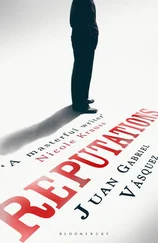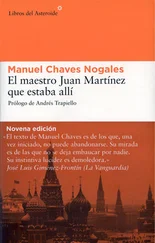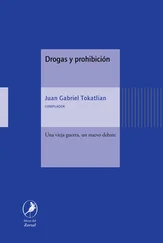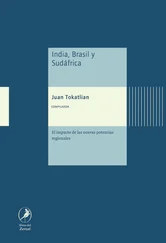“The truth is I think we could have found it,” she said.
It took me a moment to understand what she meant.
“But we looked,” I said. “You saw us.”
“I don’t think you tried very hard. Have you no pity? The bird is suffering right now. You should have found him and killed him.”
“The dogs looked. They’re good dogs, Michelle. We did everything we could.”
“You left it to suffer.”
“What’s the matter?”
“You’re cruel. You must not be quite right in the head.”
She went quiet, waiting for me to say something. She was standing in the doorway, and the room’s yellow light hit her from the side and made her features stand out on her face. I felt worn-out. I had to look at the rifle that I’d already put back in the rack to make sure it wasn’t still hanging from my shoulder.
“And what do you want?” I said. “You want me to go look for it?”
“Don’t be sarcastic.”
“No, I’m going to go,” I said. “See you later.”
“But it won’t do any good now.”
“It doesn’t matter. I think I should, Michelle. Give us a chance to take some deep breaths, count to ten, all those magazine recommendations…. We just can’t stand each other anymore, can we? Who would have thought it would jump out at us like this.”
I saw her hand move to her mouth and press her lips together between two fingers. It was her gesture of control, her secret mechanism to not start crying.
“Fine,” she said. “Tell me one thing.”
“What?”
“Are you coming back?”
There was fear in her question.
“If you’re not coming back, tell me. On the whole, I like a bit of advance warning for things like this.”
“Of course I’m coming back,” I said without looking at her. “What a stupid question.”
I walked out into the courtyard and the cold air hit me in the face. It was night and it was autumn, and the temperature had dropped drastically. Isis barked when she heard me open the gate.
—
THE FIELDS ALONG THE ROAD were the color of the night sky. Streetlights, in this part of the Ardennes, were almost nonexistent, and only the hay bales wrapped in white plastic broke through the darkness, big and round like balloons of light. I drove through Hamoir and crossed the whole village without seeing any lights on. The Maison du Pêcheur was closed, but Luca’s old Ford slumbered on its gravel forecourt. Luca was a friend to all the local hunters; he would buy the day’s catch and paid well, and in the evenings the little lounge to the left of the bar would fill up with men dressed in gray and green, their boots still caked with mud, shouting and arguing about the day’s results. But tonight they’d already gone. I knocked a couple of times on the oak door; the place was dark, and the yellow lights of the level crossing reflected back at me from the steamed-up windows. I thought that any bright, warm place was as good as the next, I thought of the friterie on Rue Saint-Roch, and it felt good to get back in the pickup and close the door and be out of the wind again. Inside, it smelled of damp clothes, but also of Michelle’s perfume. The road shone under the yellow lights until I got to the edge of town. The radio forecast fog.
The friterie on Saint-Roch was a mobile home permanently parked on the corner of Rue Saint-Roch and Route de Marches. It was white and dirty, and inside they served sausages and hamburgers and frites and gaufres with hazelnut cream that I’d never tried despite having passed through there a thousand times. As I walked up the wooden steps, I ran into a group of German tourists, and thought they must have come to see the races at Spa. The premises smelled of bleach. I found a two-hundred-franc note among the bullets and shells still in my pocket. At the table in the corner, beneath a collection of old bottles, two men were drinking beer. Above the window frame were disposable cups and a thick glass key ring. The men’s checked shirts were identical except for the color; it was as if one of them had bought both shirts, or as if someone else had chosen them. Apart from those two and the woman in a ridiculous red uniform, who was making the cash-register buttons chime as if her life depended on the volume of that ringing, there was nobody else in the place. I ordered the same as those men, frites and a beer. I chose a table I could see my truck from. The men didn’t look at me.
The older one had a harelip and his sparse mustache made it even more noticeable; the fingernails of the younger one were covered in a black film. I didn’t get as far as figuring out what kind of work they did but thought they would probably be taking a transport truck to Brussels or even to Paris, because they didn’t seem to be in a hurry to leave. The whole scene gave an impression of false calm, because the woman had stopped manipulating the cash-register keys and now her hands were busy organizing the things on the counter. There was something vaguely vulnerable about her, and it amused me to realize she was frightened. But then I thought it was perhaps legitimate that a small young woman — she wasn’t actually that small, but her fragility created that illusion — should be frightened, working alone and late in a fast-food place on the side of a dark road. I went up to the counter.
“What did you have?” said the woman.
I pointed to the remnants on the table. A cardboard plate with a bit of mustard on it and a can of Judas.
The woman wrote large numbers on a paper napkin. She pronounced a sum and I gave her some money. When she was handing me my change, a five-franc coin fell on the sheets of grease-stained wrapping on the counter.
“Don’t be scared. They’re truck drivers, they won’t hurt you.”
The woman looked at me, as if checking to make sure she didn’t know me. Then she looked toward the back, avoiding my gaze. In the irises of her eyes, I saw the brief reflection of the illuminated window. Suddenly I felt uncomfortable, intrusive, unwanted.
“Sorry,” I said. “I thought—”
“It irritates me that people can tell,” said the woman. “Everybody knows what I’m thinking, it’s terrible. It’s as if my face is a neon sign.”
“You wouldn’t be great at poker.”
“No,” she said. “You’re not the first to tell me that. Do you think they’ve noticed as well?”
The truck drivers were drinking unhurriedly. Nothing ever happens in the Ardennes; but all men are unpredictable, and anyone can be a rapist or a murderer. I felt that my presence was the only thing that gave the woman any peace of mind, and that power seemed immense and valuable. Or the woman’s peace of mind was valuable, and the possibility of her being afraid again hateful.
“I can stay for a while, if you want.”
“Oh, no,” she said with a sudden pride. “None of that. I can look after myself.”
“I can stay until they leave.”
“And how can I be sure?”
“Sure of what?”
I thought I saw her smile.
“That you’re not the one who’s going to attack me.”
The woman behind the counter smoothed a pleat in her red uniform, rubbed her index finger over her full, penciled eyebrows. Her skin was ash-colored, paler on her cheeks and broad forehead, darker under her eyes. On her right nostril sparkled a tiny diamond, worn with elegance like a family crest; when a wisp of hair fell over her face, she pushed it back under the red taffeta ribbon holding her hair flat.
“I don’t know,” I said. “I guess you have no way of knowing.”
She looked at me and smiled, but the fear had not evaporated from her face. Maybe it was a permanent feature, as Michelle’s red hair was for her, or the scar to the right of her belly button. When she was twelve, Michelle had had an appendectomy.
Читать дальше










